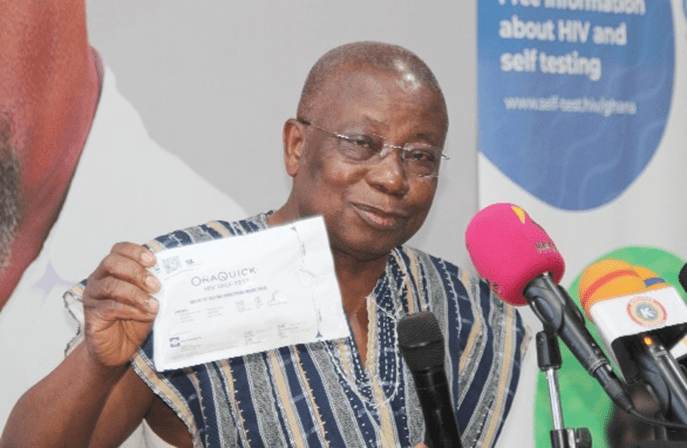…poised to enhance testing rates and reduce stigma
In a significant stride toward enhancing accessibility and encouraging proactive health management, Ghana has officially launched a national self-testing campaign for Human Immunodeficiency Virus (HIV). The campaign’s primary objectives are to increase testing rates, reduce the stigma associated with HIV, and strengthen early detection and treatment of the virus that is responsible for Acquired Immunodeficiency Syndrome (AIDS).
This collaborative effort is spearheaded by the Ghana Health Service, Ghana AIDS Commission and Ghana HIV and AIDS Network (GHANTE), with valuable support from international partners. The campaign reflects the nation’s steadfast dedication to combatting HIV and safeguarding the well-being of its citizens.
Director General of the Ghana AIDS Commission, Dr. Kyeremeh Atuahene, explained the newly launched HIV self-testing enables individuals to test themselves for the virus in the privacy of their homes or preferred locations, by using simple and user-friendly test kits that provide accurate results within minutes.
He noted the campaign’s vital role in reducing new infections and enhancing overall public health in the country. “Our target is to have a 17 percent reduction in new infections every year, but we were only able to achieve 10 percent between 2021 and 2022. By offering this easy and confidential way of knowing one’s HIV status, this programme is poised to bridge the more than seven percent gap,” Dr. Atuahene explained.
He stressed the importance of making HIV testing more accessible and convenient for all Ghanaians, and highlighted that the campaign aligns with the national commitment to achieving the UNAIDS 95-95-95 targets – aiming to ensure that 95 percent of people living with HIV know their status, 95 percent of those diagnosed with HIV receive antiretroviral therapy (ART), and 95 percent of those on ART achieve viral suppression.
Currently, there are over 350,000 people living with HIV in the country but only 71 percent of them are aware of their HIV status, according to the Ghana AIDS Commission.
Minister of Health (MoH), Kwaku Agyeman-Manu, hailed the availability of HIV self-testing kits as a significant step forward in the country’s quest to create a healthier nation. He asserted that by removing barriers to access, citizens were empowered with knowledge about the need to protect themselves, their loved ones and the wider community.
He also highlighted government’s substantial support to the HIV fight – stating that for the period of 2021 to 2023 under the grant cycle, government’s support to the National AIDS Control Programme was approximately US$30.2million; resulting in the procurement of an estimated US$4.9million worth of HIV commodities by the MoH in 2022.
The Director-General-Ghana Health Service, Dr. Patrick Kuma-Aboagye, in a speech read on his behalf by the Director of Public Health, GHS, Dr. Franklin Asiedu-Bekoe, pointed out the importance of embracing HIV self-testing, as it will bring health services closer to the people.
“The role of HIV self-testing will help in reducing transmission of the virus by identifying individuals who are unaware of their HIV status and linking them to appropriate care and treatment services. I urge all of us to take advantage of this opportunity to know our HIV status,” he urged.
The national HIV self-testing campaign will be accompanied by a robust awareness and education drive to ensure that Ghanaians are well-informed about the benefits and proper usage of self-testing kits. The campaign will leverage various communication channels, including traditional and digital media, community engagements and outreach programmes.










